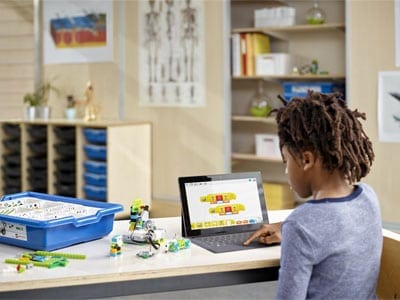Join live or receive a link to the recording and earn a CE certificate

- This event has passed.
Bring Computer Science to Life in Your Elementary Classroom
Wednesday, February 21, 2018 @ 3:00 pm - 4:00 pm EST

Presented by Joan M. Mazur, Ph.D., Professor of Instructional Systems Design, University of Kentucky College of Education; and Jennifer Rodabaugh, STEAM Lab Instructor, Fayette County Public Schools, KY
Sponsored by LEGO® Education
If you view the recording and would like a CE certificate, join the Computer Science & STEM Learning community and go to the CE Quizzes link in the Community Toolbox.
It is critical today, more than ever, to teach computer science and coding at the elementary level. Computational thinking and computer science are becoming as foundational as literacy and math for student success. Introducing these foundational concepts in elementary school prepares your students for success not just in middle school and high school, but also opens young minds to a variety of career choices from an early age. What many educators do not know is how easily computer science can tie into their current curriculum and what they are already doing in the classroom.
In this edWebinar, learn from Joan M. Mazur, Ph.D, a professor at the University of Kentucky College of Education, and Jennifer Rodabaugh, a STEAM educator, who share how they are currently inspiring and engaging elementary students in computer science and coding. The presenters share specific examples and learning outcomes that have resulted in the district by teaching computer science in a playful learning environment. Learn how to utilize hands-on tools which provide the underlying foundation of constructionism while also providing a rich learning experience for all students.
Viewers will walk away from this recorded session with lessons that can be implemented immediately in the elementary classroom. All educators interested in incorporating computational thinking and computer science into their classrooms are invited to watch, especially those working in grades K-5.

Joan M. Mazur, Ph.D. is Professor of Instructional Systems Design in the Department of Curriculum & Instruction at the University of Kentucky (UK) College of Education. She also serves as a Director of the Digital Learning & Design P-20 Innovation Lab. Her research is primarily interdisciplinary and has focused on teacher professional development and coaching for innovative classroom learning technology, narrative forms of instruction, mediating technologies and inquiry. She teaches graduate classes in mixed methods research and curriculum integration of digital gaming, social media design and various innovative technologies as they emerge. She has collaborated with the Colleges of Agriculture, Public Health, Engineering and Arts and Sciences and numerous public school districts on various projects, funded by NSF, NIOSH, DoDEA and various private foundations including BellSouth and James Graham Brown. Most recently she served as team leader on the Oversight Team for Kentucky’s Computer Science Standards that are forthcoming in Spring 2018. Dr. Mazur began at UK in 1993 after receiving her doctoral degree from Cornell University in Curriculum & Instruction. She lives with her husband on their farm in Willisburg in Washington County.

Join the Computer Science & STEM Learning community to network with educators, participate in online discussions, receive invitations to upcoming webinars, view past edWebinars, take a quiz to receive a CE certificate for a past edWebinar, and access free resources.


